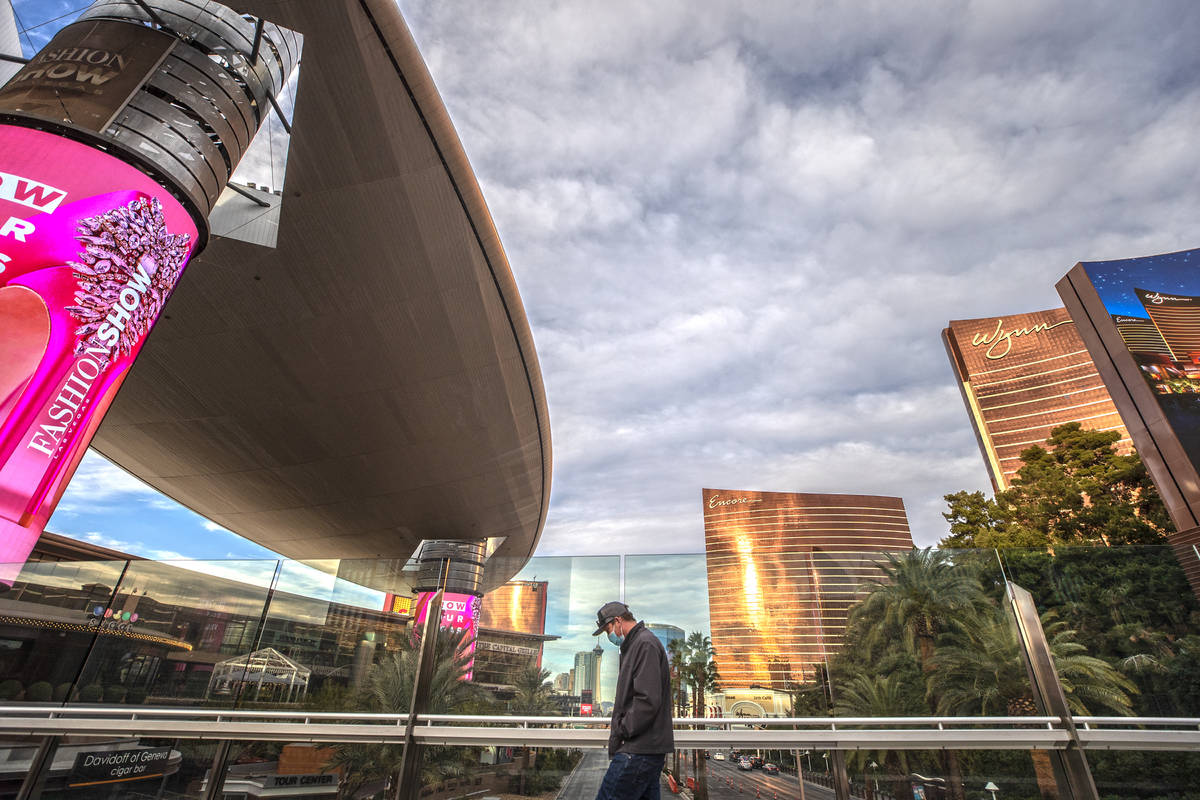Poll: Nevadans optimistic that Las Vegas’ economy will bounce back

Nevadans are optimistic about Las Vegas’ post-coronavirus future, but they believe a full economic recovery is going to take some time, according to a poll of likely Nevada voters.
Analysts who follow the city’s economy concur and stress that it will be as important to recover from the virus as it will be to recover economically.
The Nevada Poll, a phone and online survey of 500 likely voters, also indicated that about half of those questioned believe Las Vegans will continue to live with measures that decrease the chance of getting the coronavirus as opposed to largely going back to living as they did before the virus hit.
“The survey respondents seem somewhat more optimistic about the recovery of the Las Vegas economy than about the recovery from the coronavirus,” said Stephen Miller, director of UNLV’s Center for Business and Economic Research.
“If we do not achieve vaccination levels at a high enough rate and at the same time, follow public health guidelines on social interactions as we pursue vaccinations, then we may see the coronavirus variants torpedo any economic recovery as a new wave of cases, hospitalizations and deaths emerge,” Miller said.
Jeremy Aguero, principal for Las Vegas-based Applied Analysis, said it’s encouraging that consumer sentiment is aligning with the economic data the state is seeking.
“We are no longer having discussions about how deep or long the COVID-19 crisis will be but how quickly we can anticipate the recovery,” Aguero said. “That, in and of itself, is a significant step in the right direction. Notably, the poll also reflects a thoughtful balance between optimism and patience. We will get back to normal, but the majority of respondents seem to accept that the economic consequences of COVID-19 are likely to be with us well after science gets us ahead of the public health challenge.”
The response by private enterprise to the pandemic and the economic turmoil that has resulted show that Las Vegas is up to any challenge.
“The numbers are a good sign in the resilience of the city and its ability to bounce back from any challenges that it has faced,” said Brendan Bussmann, director of government affairs for Las Vegas-based Global Market Advisors.
“While the Great Shutdown has been our toughest test to date, surpassing 9/11 and the Great Recession, the industry has responded from day one to put into place health and safety measures for their employees and their guests,” Bussmann said.
‘Pretty safe first trip’
Nehme Abouzeid, president and founder of LaunchVegas LLC, said the results tell him that the public is prepared for a lengthy recovery.
“I think the responses show that public safety measures are here to stay and that people should be prepared to abide by them,” Abouzeid said. “Other surveys I have seen about live event attendees show a majority of people expect greater health measures to be woven into our experiences.”
The value of experiences compared with other places should enable a faster rebound for Las Vegas than other markets, he said.
“As people dip their toes back in the travel waters, Las Vegas is a pretty safe first trip in terms of value for money,” Abouzeid said.
The Nevada Poll also indicated that about half of those questioned believe Las Vegans will continue to live with measures that decrease the chance of getting the coronavirus as opposed to largely going back to living as they did before the virus hit.
The survey was conducted from Feb. 26 to March 1 by Washington-based WPA Intelligence for the Review-Journal. It has a margin of error of 4.4 percentage points.
The poll also asked those surveyed about the job performance of Gov. Steve Sisolak and President Joe Biden; the reopening of Clark County schools; and whether they would get a COVID vaccine.
“I would say that voters are optimistic about the future of Las Vegas (72 percent are very or somewhat optimistic), but voters are very cautious about the re-opening: a plurality (29 percent) believe it will take one to two years to recover, while a quarter (25 percent) say two to three years,” said Trevor Smith, research director for WPA Intelligence. “And to that end, a majority of voters (51 percent) believe we will continue to live with measures that decrease the chance of getting the coronavirus.”
Party differences
In an interview, Smith said most of the demographic divisions by gender, age, socioeconomic status and ethnicity had similar percentages to the overall survey — except by political party on the question of whether life would return to normal.
“The biggest difference here is by party,” Smith said. “There’s a huge difference in ideology. Liberals and conservatives are just completely different people.”
Smith said 61 percent of Democrats polled and 41 percent of Republicans believe we will continue to live with measures that decrease the chance of getting the coronavirus, each a 10 percentage-point swing from the 51 percent calculated in the full polling.
Contact Richard N. Velotta at rvelotta@reviewjournal.com or 702-477-3893. Follow @RickVelotta on Twitter.
The crosstabs attached to a previous version of this story had a typographical error in the age breakdown of poll participants. The error has been corrected in the current crosstabs.
LVRJ_NV_COVID-19_Q21-Q23_Xtabs_CORREX by Las Vegas Review-Journal on Scribd